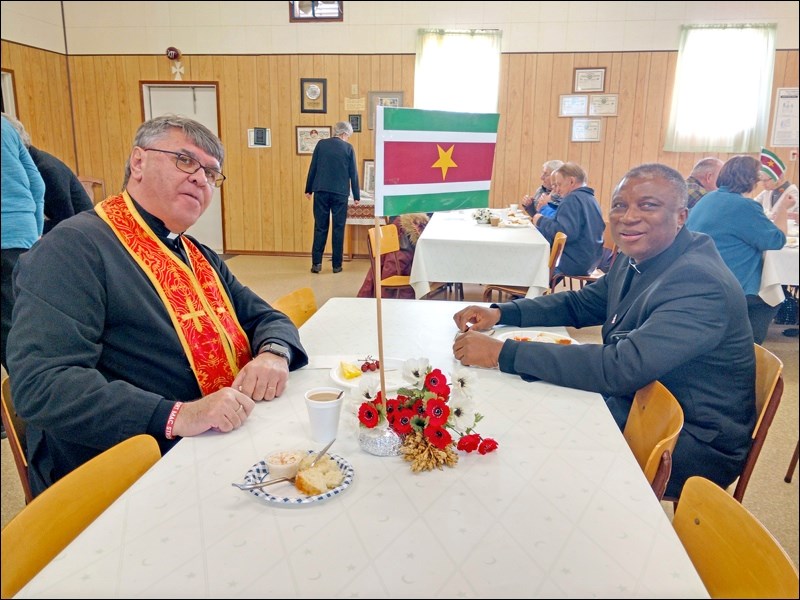Version:1.0 StartHTML:0000000280 EndHTML:0000007424 StartFragment:0000002798 EndFragment:0000007388 SourceURL:file://localhost/Volumes/CompositionFiles/%20%20Pagination%20Copy/*Thursday%20edition/Rural/hafford/Hafford%20Church%20hosts%202018%20World%20Day%20of%20Prayer.doc
Submitted
The World Day of Prayer is an international ecumenical Christian women’s initiative. It is run under the motto “Informed Prayer and Prayerful Action,” and is celebrated annually in over 170 countries on the first Friday in March. This year the featured country is Suriname, which lies in the north-eastern part of South America.
The Hafford-Speers group of churches held its annual service at the Ukrainian Catholic Church at Hafford on March 2. The program featured seven women from six local church denominations. They represented different ethnicities which make up the population of Suranime. The role play told the story of Suriname and its inhabitants consisting of indigenous, African, Asian and European (Dutch) people.
Joan Jackson of Speers, dressed in Surinamese (authentic African attire) was the first leader. Marlene McDonald (Speers United Church) acted the part of Alima, a woman of the Arawak tribe, the first inhabitants of Suriname. Their lifestyle is based on caring for and preserving nature. Her district of Marowijne has krapa trees, beautiful sea turtles and is rich in gold and bauxite.
Linda Larson, (Gospel Fellowship) played the part of Muyinga from Sipaliwina. Her ancestors were the enslaved Africans who ran away to the interior to live freely, away from the plantations. Her people are called Maroons who preserved many traditions from West Africa. They live in the tropical rainforest which represents 94 per cent of their country.
Valarie Kingsmill (Lutheran Church) was Mei Ling, a descendant of Chinese Immigrants living in the district of Coronie. Her ancestors were placed on plantations at the coast to work in agriculture. Coronie is well known for its seashells, coconut trees, flowers, birds and bees that produce rich honey.
Joyce Tkachuk (Ukrainian Orthodox) was Carolina from the District of Para. She is considered Creole. Her father was European and her mother was of African descent. The District of Para has large freshwater resources and natural creeks. Their habitat is threatened by recent mining of bauxite and gold.
Elizabeth Smith, (Roman Catholic) played Willemien, a descendant of the farmers who came from the Netherlands to work in Suriname. They are known as “Boeroes.” Many of these European immigrants did not survive the tropical diseases. Some of these people still work in agriculture.
Bernadette Harach (Ukrainian Catholic) acted the part of Shanti, from the District of Nickerie. After the abolition of slavery, workers from the Dutch colonies were hired as indentured laborers. Her ancestors originally came from India. Her parents are rice farmers and her husband works for a banana company.
Mary Saluk (Ukrainian Catholic) played the role of Kartini. Her family lives in the District of Commewijne. Her ancestors were from Indonesia and worked as indentured labourers. She practices horticulture and her husband works as a fisherman.
Clergy in attendance were Father Ivan Derkach from the host church, and Father Frederick Akah from the Roman Catholic Parish in Hafford.
Following the service the group moved to the hall where they enjoyed a meal of Suriname cuisine. The meal consisted of curried chicken, vegetable samosa, an assortment of peppers, nan (flatbread) with mango coconut spread, fruit platter and a dessert of tapioca coconut pudding.
During the meal, the group was led in song and fellowship by Father Derkach. The coming together of the local churches, in worship, song and fellowship over an ethnic meal was enjoyed by all.



